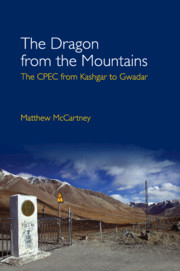Book contents
- Frontmatter
- Dedication
- Contents
- List of Maps and Figures
- List of Tables
- Preface
- Acknowledgements
- 1 Introduction
- 2 Big Infrastructure: Big Problems or Big Benefits?
- 3 CPEC Spillovers Rippling Outwards
- 4 Through the Eyes of Who? Evaluating the Success of the CPEC
- 5 The Dragon Uncoils: Special Economic Zones (SEZs) from Shenzhen to Africa
- 6 The Dragon's Embrace: Pakistan–China Trade Policy
- 7 The Will of the Dragon: The Importance of an Industrial Policy
- 8 Conclusion: The Way of the Dragon or the Way of the Falcon?
- Bibliography
- Index
3 - CPEC Spillovers Rippling Outwards
Published online by Cambridge University Press: 06 August 2021
- Frontmatter
- Dedication
- Contents
- List of Maps and Figures
- List of Tables
- Preface
- Acknowledgements
- 1 Introduction
- 2 Big Infrastructure: Big Problems or Big Benefits?
- 3 CPEC Spillovers Rippling Outwards
- 4 Through the Eyes of Who? Evaluating the Success of the CPEC
- 5 The Dragon Uncoils: Special Economic Zones (SEZs) from Shenzhen to Africa
- 6 The Dragon's Embrace: Pakistan–China Trade Policy
- 7 The Will of the Dragon: The Importance of an Industrial Policy
- 8 Conclusion: The Way of the Dragon or the Way of the Falcon?
- Bibliography
- Index
Summary
Will the infrastructure investments of the CPEC have a transformative impact on Pakistan's economy? This chapter introduces the theoretical concept of the ‘leading sector’ and asks whether the expansion of a single economic sector (such as infrastructure) can generate sufficient spillovers to other sectors so as to boost wider economic growth. We should ask whether public investment in infrastructure will crowd in private investment and whether CPEC infrastructure spending will generate employment for local workers and demand for locally produced inputs in construction. The use of economic theory has hitherto been conspicuous only by its absence from existing studies of the CPEC.
EFFICIENT MARKETS AND THE CPEC
The CPEC literature often focuses on the reductions in distance that will be created for China by the CPEC investment. Table 3.1 shows the dramatic savings in travel distance the CPEC will make to trade for China. Instead of goods from central China being transported first to Shanghai, then from Shanghai by sea to the rest of the world, they can travel directly across Western China, down through Pakistan and via Gwadar to the rest of the world. The CPEC infrastructure will reduce the distance from Central China to the Middle East by 7,580 miles and more than 10,000 miles from Western China. This will minimise the fuel and travel time from 45 to 10 days and avoiding security and robbery risks in the sea-bound Malacca route (Ahmad 2017).
There is an assumption in much of the CPEC literature that if infra-structure reduces distance and thereby creates more ‘efficient’ markets, this must be a good thing for Pakistan. This idea does have a solid academic lineage in the writings of neoclassical economists. In such writing, efficient markets contribute to the optimal allocation and reallocation of resources to their most productive uses in response to changing prices and profit opportunities. This creates the necessary conditions for economic growth. The CPEC literature makes this assumption uncritically and ignores the varied impacts that history and the contemporary world demonstrate that efficient markets may have.
Efficient markets can have a devastating impact. More ‘efficient’ markets contributed to the massive famines in railway-era colonial India. The failure of crops in Orissa in 1865–6 occurred in a region without roads and ports which made it harder to import food supplies from outside.
- Type
- Chapter
- Information
- The Dragon from the MountainsThe CPEC from Kashgar to Gwadar, pp. 49 - 77Publisher: Cambridge University PressPrint publication year: 2021



